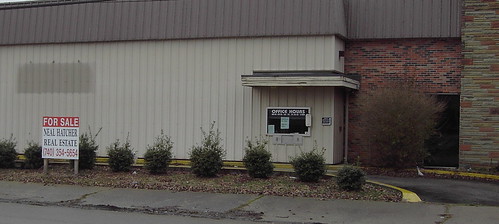
Adelphia founder in handcuffs
To better understand the Marting mess and the swindle Clayton Johnson has nearly completed with the complicity of the Portsmouth City Council, it helps to look at the so-called Adelphia building, at 807 Washington St., which Johnson made part of the package he told the city it must accept if it hopes to get back any part of the $2 million he illegally obtained from the city for the Marting building.
A little background. Adelphia is a Greek word meaning “brother,” but Adelphia’s history of corruption is enough to make anyone say “O, brother!”
A year ago this week, a federal jury found former Adelphia chairman and founder 80-year-old John Rigas (in photograph above) and his son Timothy guilty of conspiracy and massive securities and bank fraud. Rigas and Timothy were convicted of deceiving investors and hiding more than $2.3 billion in debt while using company funds to finance a lavish life style for themselves and their relatives. The father received a 15- and Timothy a 20-year sentence. The Rigas family was required to pay huge fines and to give up any stake in Adelphia, which was operating under Chapter 11 bankruptcy protection. The elder Rigas is reportedly down to his last $76 million.
Now, what about Adelphia and Portsmouth? O, brother! In 1984, a Dr. Herbert I. Singer, of Los Angeles, bought what became known as the Adelphia building, on Washington Avenue, from Michael H. Mearan, a local lawyer who specializes in auto accidents and bankruptcy. Dr. Singer leased the building to Adelphia for twenty years, but Adelphia reportedly abrogated that lease in its last year, presumably because Adelphia was in bankruptcy and could get away with abrogating leases and not paying its bills.
About that time, Adelphia moved from Washington St. to its new location, not far from the 15th Street viaduct development. Given the 15th St. viaduct’s shady history and shady tenants, it should be called “Shady Plaza.” The Adelphia building on Washington Street was convenient to customers and far better suited than its current building, which looks and feels like a fur trading outpost in the wilds of Alaska. When I asked an Adelphia representative why the company had moved from Washington St., she said it was because the rent on Washington St. was too high – $2,200 a month.
Did Adelphia try to renegotiate the lease? I don’t know, but Adelphia was in an excellent position to do so, because commercial and retail property in downtown Portsmouth is notoriously hard to rent and even harder to sell. For example, according to figures in the auditor’s office, in the Scioto County Courthouse, in 2001 the true cash value of Adelphia’s Washington St. property – actually Dr. Singer’s property – was listed at $958,970; three years later that figure had been reduced 66% to $319,920.
It is hard to believe, with the value of the Washington St. property plummeting 66%, that Adelphia could not have gotten its rent reduced or even bought the property at a distressed price from Dr. Singer. If the city was sincerely interested in reviving downtown, they should have done everything to encourage Adelphia to stay on Washington St. That would have made sense, at least for Adelphia’s customers, but Adelphia does not think first of its customers, not when it has a cable monopoly and a city council that cares about its constituents about as much as Adelphia does for its cable customers.
By moving to “Shady Plaza,” Adelphia not only did a disservice to its customers, but it apparently dealt a karate chop to Dr. Singer, who filed for bankruptcy. In speaking before the city council, Dr. Singer’s lawyer denied his client had declared bankruptcy, but records in the Scioto County Courthouse at the time and still today prove otherwise. Why did Mr. Singer’s lawyer deny he was in bankruptcy? It is possible that Singer is trying to use bankruptcy in the way Adelphia used it, to avoid meeting his financial obligations. The suspicion that Dr. Singer is yet another shady character in this Adelphia corruption saga is heightened by the fact that he is in default for about $18,000 in city taxes on his Washington St. property, taxes which his filing for bankruptcy puts in abeyance.
One of the refreshing things about Dr. Singer and his lawyer, Mr. Mearan, is how candid they are about the underlying reason Dr. Singer is offering the property to the city. There is no moonshine about saving downtown Portsmouth and no Herbert I. Singer Foundation façade has been established to provide a front of civic-mindedness for Singer’s pecuniary motives. According to Portsmouth City Council minutes (14 March 2005), “Mr. Mearan said that in order for Dr. Singer to take advantage of certain IRS regulations the City could not sell or lease the building because that would set a value on the property and would restrict the amount Mr. Singer can claim as a donation to the City. Mr. Mearan stated that with the understanding that the City would accept the property and use it for City purposes [italics added], with a restriction of ten years[,] after which if the City wants to get rid of the building or do whatever they want with the building they could do so.” After ten years, Dr. Singer doesn’t care what the city does with the Washington St. property; they can flush it down the toilet for all he cares. What he wants is for the city to use the property for some public purpose for a minimum of ten years or otherwise he will be greatly restricted in what he can claim as a tax write for a charitable donation.
We need to understand that this is also the motive behind the Marting Foundation’s offer to give the city the Marting building that it had previously fraudulently tried and failed to sell to it: in order for Singer and for Johnson to qualify for maximum tax write-offs the property they donate must by IRS regulations be used for government purposes, in the case of the Adelphia building as a police station and in the case of the Marting building as a city hall.
Public policy in Portsmouth is being dictated not by what is best for the city and its citizens but by what is best for privileged property-owners who want to unload their virtually worthless buildings off on the public for the purposes of tax write-offs. And it is not just the Marting and Adelphia buildings that are being foisted off on the public. The practice of getting the public to pay for property that is no longer of use to it owners and of very little value in the local real estate market is long-standing and widespread in Porksmouth.
Instead of using millions of dollars of public monies to build structures designed for the purposes to which they will be put, the city government receives old and architecturally embarrassing hand-me-downs that require ridiculous outlays to try to transform them into the public buildings they were so obviously never intended to be. In the meanwhile public buildings of architectural importance and practical value are derided and torn down, while for at least ten years, these other old buildings, such as the Marting and Adelphia buildings, with new phony facades, will have to be renovated and maintained, at large public expense, just so that the tax breaks to the privileged few can not be challenged by the IRS. After ten years the buildings can be flushed down the toilet, which is probably what should have been done in the first place. Or to repeat the startlingly candid language of the minutes of the March 14th city council meeting: “Mr. Mearan stated that with the understanding that the City would accept the property and use if for City purposes, with a restriction of ten years[,] after which if the City wants to get rid of the building or do whatever they want with the building they could do so.” O, brother!

